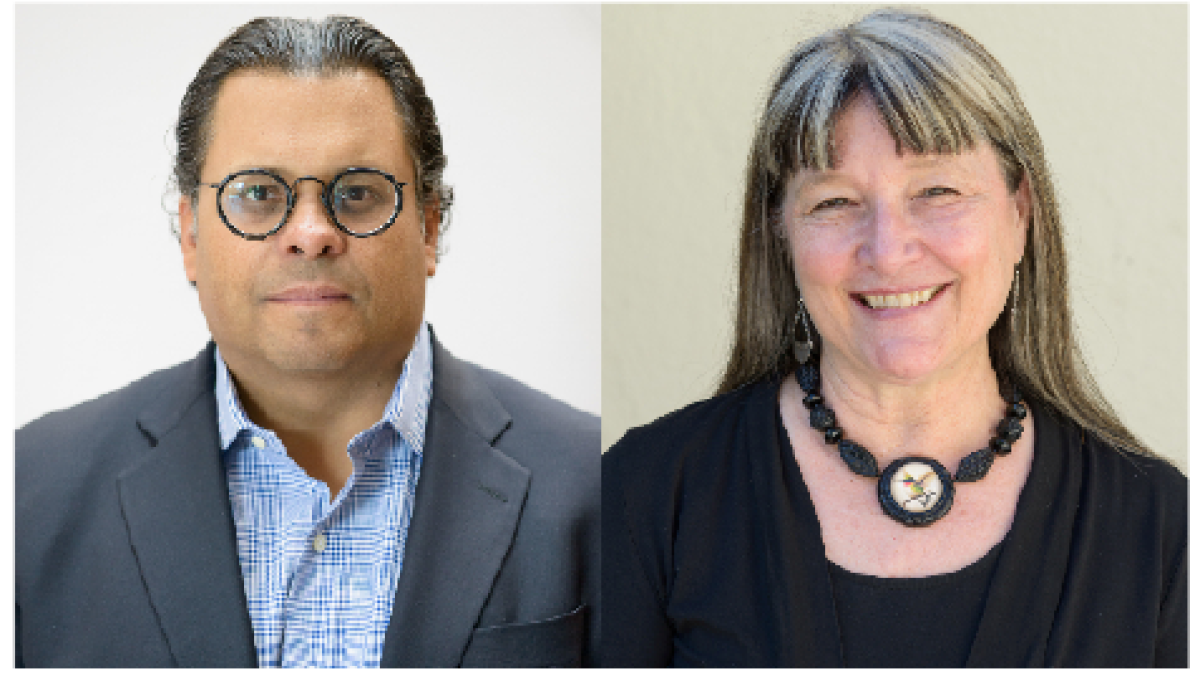President’s Professors advance anthropology, indigenous research and education

Two ASU professors in the College of Liberal Arts and Sciences will be named 2014 President’s Professors on April 18 at the Faculty Excellence Awards.
Kaye Reed, a professor in the School of Human Evolution and Social Change, and Bryan McKinley Jones Brayboy, Borderlands Professor of Indigenous Education and Justice in the School of Social Transformation, will be recognized at a ceremony set to take place at 4:30 p.m., in the Marston Exploration Theater (ISTB-4) on the Tempe campus, hosted by ASU President Michael M. Crow and University Provost Robert E. Page Jr.
Guests are welcome to attend the reception at 3:30 p.m. outside the theater.
The President’s Professor award honors faculty who have made significant contributions to undergraduate education at ASU. Awardees are chosen based on a variety of criteria: mastery of subject matter; enthusiasm and innovation in the learning and teaching process; ability to engage students both within and outside the classroom; ability to inspire independent and original thinking in students and to stimulate students to do creative work; innovation in course and curriculum design; and scholarly contributions.
Professor Brayboy joined ASU in 2007. A Centennial Professor, director of the Center for Indian Education and member of the Lumbee Nation, Brayboy seamlessly weaves together rigorous research, teaching and service. He has written and edited five books and authored dozens of book chapters, journal articles, essays, policy and technical reports about the experiences of Indigenous students, staff and faculty, and Indigenous knowledge systems and research methods. He is also an affiliate faculty member in American Indian Studies, Department of English, Mary Lou Fulton Teachers College and Learning Sciences Institute at ASU.
Teaching, he believes, should be “nimble and work in relation to where students are socially, technologically and academically.” Brayboy teaches difficult topics in ways that open up new ways of thinking and relating. “I am guided by a fundamental understanding that courses are spaces for growth, retrenchment and expansion of personhood, belief systems and understandings of the world around us.”
“Professor Brayboy places the student front and center at all times,” said Mary Margaret Fonow, director of the School of Social Transformation. “Much of his research and service concerns the experiences of Native American students in higher education, so his teaching is informed by his scholarship and community outreach. He is generous with his time and talent. Students are fortunate to have such a caring and innovative professor who believes in their potential.”
President’s Professor Reed came to ASU in 1997, at the same time as the Institute of Human Origins, which was originally based in California. A Centennial Professor, research associate in the institute and director of graduate studies in the School of Human Evolution and Social Change, Reed’s research interests center on biological anthropology, primate evolution, landscape ecology and paleoecology – the use of fossils to examine the ecological context for evolution.
Her studies have taken her to Morocco, Spain, Eritrea, Argentina, South Africa and Ethiopia, where she also teaches at ASU’s Paleoanthropology Field School in Hadar. Her teaching philosophy emphasizes hands-on, life experiences beyond a regular program of study, with accessible faculty to subtly assist in guiding students to their full potential.
“Africa offers more than an education in paleoanthropology," said Reed. "There are life-changing experiences for undergraduates as well – learning how to interact with other cultures, to respect other religions and to consider abject poverty. I like to think that the students who had these experiences were prepared for more than their chosen field of study; they were prepared for life."
Reed received the Outstanding Faculty Mentor Award from the Faculty Women’s Association in 2013.
“Dr. Reed brings real adventure into her teaching, in the old-fashioned sense of discovery and pushing the frontiers,” said Alexandra Brewis Slade, director of the School of Human Evolution and Social Change. “What I especially admire is that she is doing this in so many different ways – taking students on study abroad to South Africa to discover how early hominids lived, to her more recent innovations in virtual field trip technologies that allow many more students who otherwise can't go to Africa to share that experience as well. She is also just a truly generous mentor, and has helped so many students over the years exceed their own career dreams.”
“I know that I can’t reach everyone who crosses my path,” said Reed, “but I strive to create an environment where the students who desire to pursue learning experiences that they may think are out of their reach will have an ally.”

